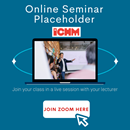Welcome to Topic 6: Your Personal Study Skills. This topic will engage you in considering your time management, your personal learning styles and effective strategies, how to reflect on your learning and ways in which to give and respond to feedback from peers and tutors.
In this topic, you will learn about:
- Time management
- Personal learning styles
- Strategies for effective learning
- Reflection and feedback
- Notetaking.
These relate to the Subject Learning Outcomes:
- Discuss the written, verbal, listening and non-verbal communication skills in academic, professional and intercultural settings.
- Outline the critical thinking and academic research skills required to make informed decisions.
Welcome to your pre-seminar learning tasks for this week. Please ensure you complete these prior to attending your scheduled seminar with your lecturer.
Click on each of the following headings to read more about what is required for each of your pre-seminar learning tasks.
Reflection: How do you learn best?
Traditional study styles have been focused on memorising and repeating information, with a more recent move towards autonomy and evaluating the information we are presented with. What is your educational background? What kind of teaching styles are you used to?
Based on your study experiences and what you have studied so far in this subject, write a 200-word reflection on what you have learned about your own learning and study skills. Use Gibbs’ Reflective Cycle to structure your writing.
Review the following website: Skillsyouneed 2021, Study Skills, Skillsyouneed
Task: What skills do you already have, and what do you need to develop? Make some notes to bring to your class for discussion.
Use the planner in Worksheet 1 to map out the other commitments you have to identify when you have time to focus on your learning.
Time ‘to focus on your learning’ is time that you can plan for, set aside and stick to without interruption. It is time that you can prioritise for your study. Look at your current schedule and be open to identifying times that you can genuinely set aside. Twenty minutes here and there is not enough to empty your mind of distractions. Focus on your topic and achieve some real results.
It is important to find something that works without taking time away from your day. The temptation can be to make beautiful to-do lists with colour and stickers or to fill a web page with ideas, which actually distracts you from what you should be doing!
Consider the following questions:
- What tools do you use to manage your time?
- Is the calendar on your phone enough?
- Or do you need to write things down?
Watch the following videos and compare these in the table in Worksheet 2. Reflect and evaluate to decide on time management tool(s) that work best or that you would like to try. Set aside an hour of your daily schedule to complete this task.
- Bullet Journaling
- Google Keep & Calendar
- Trello
- Timeboxing: Elon Musk's Time Management Method.

The keys to success
There are many keys to success. Some of these are luck but many more rely on good judgement. The success you have based on the judgements you make often come from your own curiosity. If you are curious about the world, about yourself and the people around you, you are more likely to find a sense of self, where you fit in, and how you can be your best self. Of course, there will be times when you get it wrong when you make the wrong call and perhaps even have to start over. However, coming back to your innate curiosity and embracing that as a strength will get you back on track. You will be able to reflect on what has happened and your part in that, and you will see a clearer path for your journey ahead.
The lucky keys can be where and when you were born. It can be your gender or your nationality. It could be the school your parents chose to send you to. It could be your family structure. However, one thing is true – people have succeeded no matter where they have come from. The keys to their success have been passion, drive and curiosity. Be confident in your curiosity and learn to channel it to your best advantage. Identify your strengths, understand your weaknesses and areas to improve, and be diligent in finding the tools and people that will bring you the most success.
Time management
the practice of using the time that you have available in a useful and effective way, especially in your workTime management 2021
Managing your time effectively is a skill that, once mastered, will live with you. You will achieve more and pass your lessons on to family, friends and colleagues. However, everyone is different. So, what works for you may need to be tweaked for someone else. A suggestion you are given may be absolutely wrong for you at the time, but if you have the curiosity to explore and experiment, you will find something else that matches you, your skillset and your goals.
Time management has helped people organize their professional lives for centuriesAeon & Aguinis 2017, p.1
A study by Landry (2019) focused on the importance of time management skills in undergraduate students. Through the use of a questionnaire and by asking students to reflect, he determined that respondents who were enrolled in a class from the previous semester believed that time management skills were crucial, especially for managing deadlines. As you start your studies and develop a work-life balance, think of advancing your time management skills now, rather than leaving it for later.
Morgan (2020) developed a skills self-assessment, which you can complete in Worksheet 6 to help you understand your own behaviours and motivations. The following statements are a sample of the types of items included in the assessment. For each item, you need to decide how strongly you feel the statement is true for you.
- I get my things ready for the next day’s study or work the night before.
- I ‘live for the moment’. Tomorrow is another day which will take care of itself.
- I often plan ahead and think through every possible outcome.
- I find it easy to begin assignments and essays.
- I have never had two appointments clashing at the same time (Morgan 2020).
By reflecting on and responding to these items carefully and honestly, you will understand that ‘learning to manage your ability to use time well will not automatically give you success as a student, but failing to do so well will make passing your courses difficult, if not impossible to achieve’ (Morgan 2020).
Independent study
It is easier to study and focus on your study when you have the time and space to do this. However, there are many demands on your time, especially when you are studying online and do not have the discipline of a formal classroom setting. In order to give yourself that time and space, it is good to recognise and understand the other calls there are on your time.
With the new complexities of studying by distance in tertiary education, we are seeing the added challenge of little to no face-to-face input. It is, therefore, crucial that you learn to manage your time and develop autonomous study skills (Padmadewi et al. 2020). Use planning tools to allocate your time appropriately and to manage your motivation can be very helpful.
Look out for opportunities to improve and widen your knowledge. These can include:
- participating in professional development (PD) opportunities at work
- the chance to do a course or a workshop outside of your work or study areas
- there could be a volunteering opportunity that will bring you extra connections
- the chance to practise your skillset
- there could be another academic course that you would like to take.
Independent study and a mindset of lifelong learning is a valuable habit to acquire and keep. It will help you stay curious.

Reflect on the skills outlined as learning outcomes in your current course. Align these with your work goals and endeavour to find opportunities that will keep your skillset current.
As you embark on your learning journey, you will start discovering your learning style. Continue to seek guidance and help to solidify this critical aspect of your education experience. Remember, your learning style could be very different to how your peers or friends learn. What might work for someone else may not be the best fit for you. It might mean that you need to follow a process of trial and error to determine some strategies that work well for you. Managing your time effectively is also a key factor in developing your learning style from the start of your learning journey.
Knowledge check
Complete the following three (3) tasks. Click the arrows to navigate between the tasks.
Key takeouts
Congratulations, we made it to the end of the sixth topic! Some key takeouts from Topic 6:
- Learning does not stop once study ends.
- Curiosity is the key to lifelong learning and professional development.
- Reflection and feedback will give you the direction you need to continue your learning journey, but they are like muscles that need to be trained and exercised.
Welcome to your seminar for this topic. Your lecturer will start a video stream during your scheduled class time, you can access your scheduled class by clicking on ‘Live Sessions’ found within your navigation bar and locating the relevant day/class or by clicking on the following link and then click 'Join' to enter the class.
Click here to access your seminar.
The learning tasks are listed below, these will be completed during the seminar with your lecturer. Should you be unable to attend, you will be able to watch the recording which can be found via the following link or by navigating to the class through ‘Live Sessions’ via your navigation bar.
Click here to access the recording. (Please note: this will be available shortly after the live session has ended.)

In-seminar learning tasks
The in-seminar learning tasks identified below will be completed during the scheduled seminar. Your lecturer will guide you through these tasks. Click on each of the following headings to read more about the requirements for each of your in-seminar learning tasks.
"Knowledge workers create knowledge and have know-how about customer and client expectations, research methods, sales trends, production methods, industry practice and strategic direction" (Dwyer 2016).
Creating knowledge comes from identifying existing knowledge, using that to inform thoughts and projects and synthesising new ideas, directions, products and thoughts.
- Use Gibbs’ Reflective Cycle (1988) to help you respond to the following:
- Describe when you have incorporated research into your study.
- Describe when you have incorporated research into the evaluation and planning stage of your studies.
- What have your positive or negative experiences taught you about future practice?
- Develop your ideas using Worksheet 3 and post your response to the Discussion Forum 'Topic 6: Forum Activity 1'. You can also navigate to the forum by clicking on 'ESK100 Subject Forum' in the navigation bar for this subject.
Use Worksheet 4 to help you formulate your arguments and discuss answers to the questions below with your peers.
Watch the video, Lessons from the longest study on human development, and make links between the findings and your thoughts on the value of research.
- What are the benefits of research?
- What can this practice teach us?
- How can we benefit from good research?
Welcome to your post-seminar learning tasks for this week. Please ensure you complete these after attending your scheduled seminar with your lecturer. Your lecturer will advise you if any of these are to be completed during your consultation session. Click on each of the following headings to read more about the requirements for each of your post-seminar learning tasks.
- In your pre-seminar learning task 4: Finding the right time management tool for you, you chose one time management tool to try out. Now reflect on your chosen time management method. How appropriate was it for you and your skillset requirements for future work goals?
- Post your reflection to the discussion forum 'Topic 6: Forum Activity 2'.
This learning task consists of two (2) parts:
Part 1: Read 'Why Professional Development Matters' and complete Worksheet 5 to help develop your thoughts about lifelong learning.
Then, reflect on what you have learned over the last five (5) topics of this subject, and match this to the ideas you have about the work you want to do after you graduate.
Part 2: complete 'Topic 6: Forum Activity 3', this information will be useful in future seminars.
- Dwyer, J 2016, Communication for business and the professions: Strategies and skills, Pearson. pp. 329 – 334.
References
- Aeon, B & Aguinis, H 2017, ‘It’s about time: New perspectives and insights on time management’, Academy of management perspectives, 31(4):309-330.
- Dwyer, J 2016, Communication for business and the professions: Strategies and skills, Pearson.
- Gibbs, G 1988, Learning by doing: a guide to teaching and learning methods, Oxford Polytechnic.
- Landry, MH 2019, ‘The Efficacy of Teaching Independent Study Skills Within English for Academic Purposes Programs’, BC TEAL Journal, 4(1):1-12.
- Morgan, P 2020, The business student’s guide to study and employability, Sage.
- Padmadewi, NN, Artini, LP & Agustini, DAE 2020, 'Promoting autonomous learning and 21st century skills of English education students through empowering their pedagogical skills', In Proceedings of the 4th Asian Education Symposium (AES 2019): Advances in Social Science, Education and Humanities Research, 200513
- Time management 2021, Cambridge Dictionary, https://dictionary.cambridge.org/dictionary/english/time-management

